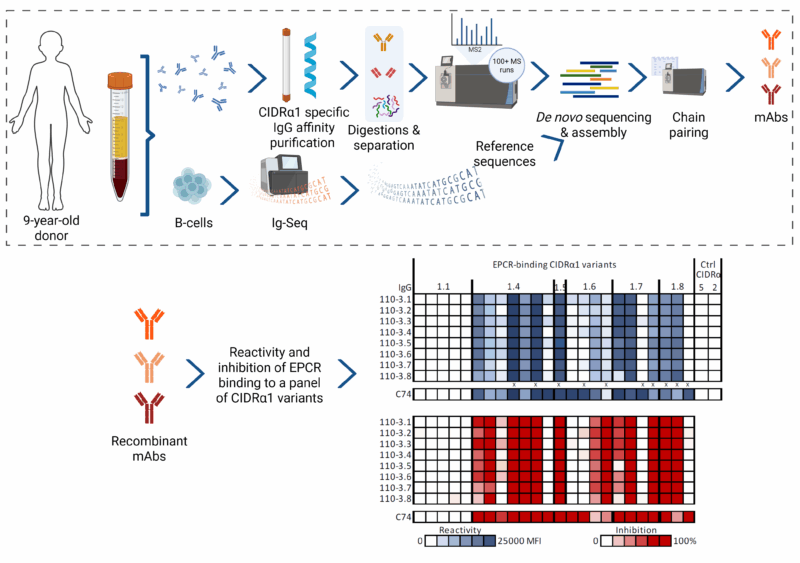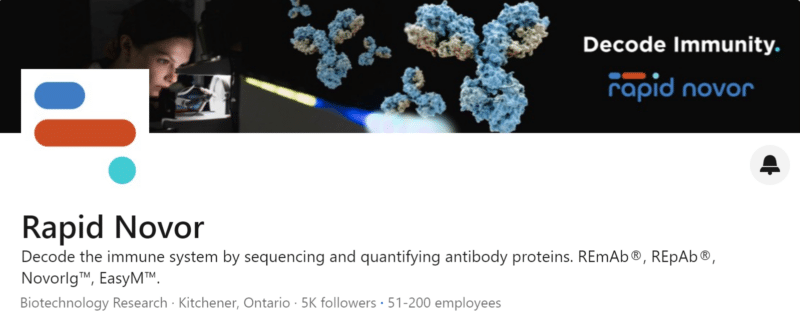L. Turner, T. Nunez de Villavicencio Diaz, S.S.R. Raghavan, et al., Identification of broadly inhibitory anti-PfEMP1 antibodies by mass spectrometry sequencing of plasma IgG from a malaria-exposed child, Proc. Natl. Acad. Sci. U.S.A. 122 (34) e2508744122, https://doi.org/10.1073/pnas.2508744122 (2025).
Key Takeaways
- Immunity to severe malaria develops through repeated exposures, leading to the production of antibodies that block the interaction between the parasite protein PfEMP1 and the human receptor EPCR.
- Antibody discovery using REpAb® polyclonal antibody sequencing identified protective antibodies involved in malaria immunity, directly from the blood of a 9-year-old child with prior disease exposure.
- This study highlights REpAb’s capability to identify protective antibodies within the circulating repertoire of individuals naturally exposed to infection.

Overview of antibody discovery with REpAb polyclonal sequencing on human plasma samples. CIDRα1-reactive IgG was purified from the plasma of a 9-year-old donor by affinity chromatography using CIDRα1 domains of PfEMP1 The purified IgG was subjected to mass spectrometry analysis as described in [26]. In parallel, a database of immunoglobulin heavy and light chain V region transcripts was generated from B-cells of the same sample using next-generation sequencing (Ig-seq). IgG sequences were subsequently expressed recombinantly and experimentally tested for binding reactivity and inhibition of EPCR binding to a panel of CIDRα1 variants.
Summary
Malaria is caused by Plasmodium falciparum, which infects erythrocytes and sequesters them in the capillaries of vital organs, leading to organ failure. This is driven by parasite proteins called P. falciparum erythrocyte membrane protein 1 (PfEMP1), which adhere to endothelial cell receptors in the microvasculature.
Variants of PfEMP1 are diversified in their cysteine-rich interdomain region alpha 1 (CIDRα1) domain, which binds selectively to human endothelial protein C receptors (EPCR). Individuals living in malaria-endemic regions gradually acquire immunity to malaria through repeated exposure. This immunity is driven by the development of antibodies that block the interaction between the CIDRα1 domain of PfEMP1 and EPCR, thereby preventing disease pathogenesis.
Discovering such inhibitory antibodies is essential, as it offers insight into naturally acquired protective mechanisms and informs the development of new interventions to prevent severe malaria.
Rapid Novor, in collaboration with researchers at the University of Copenhagen, The Scripps Research Institute, and National Institute for Medical Research in Tanzania employed REpAb® antibody discovery, using liquid-chromatography with mass spectrometry and immunoglobulin cDNA sequencing to sequence circulating antibodies from the plasma of a 9-year-old child with previous malaria exposure.
REpAb analysis revealed a subset of monoclonal IgG antibody variants, named 110-3 that underwent further functional characterization. Recombinant 110-3 antibodies exhibited strong inhibition of EPCR binding broadly across CIDRα1 variants. Structural analysis with cryo-electron microscopy confirmed that these inhibitory antibodies bind at the CIDRα1s EPCR-binding site.
The study demonstrates REpAb’s ability to uncover protective antibodies from the circulating repertoire. By sequencing antibodies involved in naturally acquired immunity, it advances the understanding of human immune responses, infectious disease research and therapeutic antibody discovery.
Talk to Our Scientists.
We Have Sequenced 10,000+ Antibodies and We Are Eager to Help You.
Through next generation protein sequencing, Rapid Novor enables reliable discovery and development of novel reagents, diagnostics, and therapeutics. Thanks to our Next Generation Protein Sequencing and antibody discovery services, researchers have furthered thousands of projects, patented antibody therapeutics, and developed the first recombinant polyclonal antibody diagnostics.
Talk to Our Scientists.
We Have Sequenced 9000+ Antibodies and We Are Eager to Help You.
Through next generation protein sequencing, Rapid Novor enables timely and reliable discovery and development of novel reagents, diagnostics, and therapeutics. Thanks to our Next Generation Protein Sequencing and antibody discovery services, researchers have furthered thousands of projects, patented antibody therapeutics, and ran the first recombinant polyclonal antibody diagnostics

